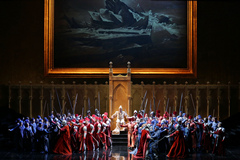| Opera Reviews | 6 May 2024 |
Domingo enjoys further success at La Scalaby Silvia Luraghi |
|
| Verdi: Simon Boccanegra Teatro alla Scala, Milan 9 November 2014 |
|
|
At the first performance, Domingo was in very good shape. Among baritone roles recently added to his repertoire, Boccanegra is one that especially suits him, as it gives him the opportunity to display all his theatrical skills, and does not only require him to rely on the voice. Thus, even if he still sounds like a tenor rather than a baritone, his performance is always compelling: his interpretation is touching and authoritative when needed, and his musicality allows him to master a score which is written for a different type of register. Tatiana Serjan as Amelia/Maria displayed a notable volume of voice, but with uncertain control, especially at the top. Much better was the interpretation of Fabio Sartori, a very good Gabriele Adorno: his ringing, sizable tenor, nicely colored and homogeneous, is perfect for the role, and he deserved the only applause that interrupted the performance during the whole night. Orlin Anastassov as Fiesco was a disappointment: the color of his voice is too light for this role, and he failed to produce an adequate volume. The production directed by Federico Tiezzi had already been seen at La Scala in 2010, also with Domingo in the title role. The sets designed by Pier Paolo Bisleri were quite simple, but still appropriate: a high staircase led to the gate of Fiesco’s palace in the first act, with the back of the scene taken by the masts of some ships, the council scene featured a huge row of gold painted, high backed benches. The garden of the Grimaldi’s palace, where Boccanegra first learned that Amelia was no less than his daughter in disguise had no vegetation, until the duet between father and daughter, when three trees slowly started moving down from above the stage. The costumes by Giovanna Buzzi were generically remindful of the Italian Renaissance, except for the women of the chorus in the last scene, who wore long 19th century coats. Maestro Barenboim conducted the orchestra with a somewhat dry sound that did not especially appeal to Verdi’s specialists. In the end, the whole cast enjoyed a great success, which turned into a triumph for Plácido Domingo.
|
|
| Text ©
Silvia Luraghi Photo © Brescia/Amisano © Teatro alla Scala |

 Plácido Domingo returned to Milan with one of his favorite baritone roles, Simon Boccanegra. For this occasion, La Scala presented two casts: in the first, the title role was taken by Leo Nucci, and the orchestra was conducted by Stefano Ranzani, while Domingo sang conducted by Daniel Barenboim in the second cast.
Plácido Domingo returned to Milan with one of his favorite baritone roles, Simon Boccanegra. For this occasion, La Scala presented two casts: in the first, the title role was taken by Leo Nucci, and the orchestra was conducted by Stefano Ranzani, while Domingo sang conducted by Daniel Barenboim in the second cast. 





